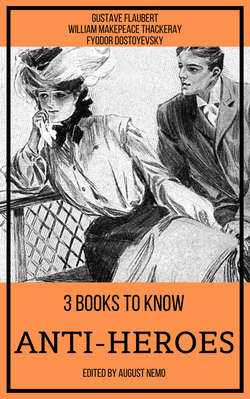Читать книгу 3 books to know Anti-heroes - Уильям Мейкпис Теккерей, August Nemo, John Dos Passos - Страница 4
На сайте Литреса книга снята с продажи.
ОглавлениеAuthors
WILLIAM MAKEPEACE THACKERAY, (born July 18, 1811, Calcutta, India—died Dec. 24, 1863, London, Eng.), English novelist whose reputation rests chiefly on Vanity Fair (1847–48), a novel of the Napoleonic period in England, and The History of Henry Esmond, Esq. (1852), set in the early 18th century.
In his own time Thackeray was regarded as the only possible rival to Dickens. His pictures of contemporary life were obviously real and were accepted as such by the middle classes. A great professional, he provided novels, stories, essays, and verses for his audience, and he toured as a nationally known lecturer. He wrote to be read aloud in the long Victorian family evenings, and his prose has the lucidity, spontaneity, and pace of good reading material. Throughout his works, Thackeray analyzed and deplored snobbery and frequently gave his opinions on human behaviour and the shortcomings of society, though usually prompted by his narrative to do so. He examined such subjects as hypocrisy, secret emotions, the sorrows sometimes attendant on love, remembrance of things past, and the vanity of much of life—such moralizing being, in his opinion, an important function of the novelist. He had little time for such favourite devices of Victorian novelists as exaggerated characterization and melodramatic plots, preferring in his own work to be more true to life, subtly depicting various moods and plunging the reader into a stream of entertaining narrative, description, dialogue, and comment.
***
FYODOR MIKHAILOVICH Dostoevsky (11 November 1821 – 9 February 1881) was a Russian novelist, short story writer, essayist, journalist and philosopher. Dostoevsky's literary works explore human psychology in the troubled political, social, and spiritual atmospheres of 19th-century Russia, and engage with a variety of philosophical and religious themes. Many literary critics rate him as one of the greatest psychologists in world literature.
Born in Moscow in 1821, Dostoevsky was introduced to literature at an early age through fairy tales and legends, and through books by Russian and foreign authors. His mother died in 1837 when he was 15, and around the same time, he left school to enter the Nikolayev Military Engineering Institute. After graduating, he worked as an engineer and briefly enjoyed a lavish lifestyle, translating books to earn extra money. In the mid-1840s he wrote his first novel, Poor Folk, which gained him entry into St. Petersburg's literary circles. Arrested in 1849 for belonging to a literary group that discussed banned books critical of Tsarist Russia, he was sentenced to death but the sentence was commuted at the last moment. He spent four years in a Siberian prison camp, followed by six years of compulsory military service in exile. In the following years, Dostoevsky worked as a journalist, publishing and editing several magazines of his own and later A Writer's Diary, a collection of his writings. He began to travel around western Europe and developed a gambling addiction, which led to financial hardship. For a time, he had to beg for money, but he eventually became one of the most widely read and highly regarded Russian writers.
Dostoevsky was influenced by a wide variety of philosophers and authors including Pushkin, Gogol, Augustine, Shakespeare, Dickens, Balzac, Lermontov, Hugo, Poe, Plato, Cervantes, Herzen, Kant, Belinsky, Hegel, Schiller, Solovyov, Bakunin, Sand, Hoffmann, and Mickiewicz. His writings were widely read both within and beyond his native Russia and influenced an equally great number of later writers including Russians like Aleksandr Solzhenitsyn and Anton Chekhov as well as philosophers such as Friedrich Nietzsche and Jean-Paul Sartre. His books have been translated into more than 170 languages
***
GUSTAVE FLAUBERT began his literary career at school, his first published work appearing in a little review, Le Colibri, in 1837. In November 1841 Flaubert was enrolled as a student at the Faculty of Law in Paris. At age 22, however, he was recognized to be suffering from a nervous disease that was taken to be epilepsy, although the essential symptoms were absent. This made him give up the study of law, with the result that henceforth he could devote all his time to literature.
Madame Bovary cost the author five years of hard work. Du Camp, who had founded the periodical Revue de Paris, urged him to make haste, but he would not. The novel, with the subtitle Moeurs de province (“Provincial Customs”), eventually appeared in installments in the Revue from October 1 to December 15, 1856. The French government then brought the author to trial on the ground of his novel’s alleged immorality, and he narrowly escaped conviction.
To refresh himself after his long application to the dull world of the bourgeoisie in Madame Bovary, Flaubert immediately began work on Salammbô, a novel about ancient Carthage, in which he set his sombre story of Hamilcar’s daughter Salammbô, an entirely fictitious character, against the authentic historical background of the revolt of the mercenaries against Carthage in 240–237 BC.
Flaubert died suddenly of an apoplectic stroke. He left on his table an unfinished page and notes for the second volume of his novel. Bouvard and Pécuchet, tired of experimenting, were to go back to the work of transcribing and copying that they had done as clerks.
